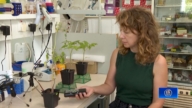【新唐人2011年4月27日讯】 【看新闻学英语】
Japan’s Hedge Fund Housewives
日本的避险基金家庭主妇
【新闻关键字】
1. hedge fund: n. [hɛdʒ fʌnd]避险(对冲)基金
2. sophisticated: adj. [səˋfɪstɪ͵ketɪd]精明的、富有经验的
3. make up: ph. [mekʌp]组成
4. long(short) position: n. [lɔŋ]/ [ʃɔrt] [pəˋzɪʃən]多(空)头
5. conceal: v. [kənˋsil]隐藏
6. short: v. [ʃɔrt] 卖出
7. crucial: adj. [ˋkruʃəl] 决定性的、重要的
8. in vogue: ph. [ɪn] [vog] 正在流行
9. flood with: ph. [flʌd] [wɪð] 充满、充斥
10. liquidity: n. [lɪˋkwɪdətɪ] 流动性
11. in contrast to: ph. [ɪn] [ˋkɑn͵træst] [tu] 与….形成对比
12. opt: v. [ɑpt] 选择
This is Etsuko Someya–married for eight years with a young child.
这是Etsuko Someya – 结婚八年,有一名年糼的孩子。
But in forex markets, she’s known as Mrs. Watanabe–one of hundred of thousands retail investors in Japan trading currencies.
但在外汇市场中,她被称为渡边太太 – 是日本货币交易,数十万散户投资者之一。
Many of them are housewives, and they are sophisticated–using technical analysis just like professionals do. Etusuko herself earns 12 thousand U.S. dollars a month from trading.
她们很多是家庭主妇,而且很精明。使用技术分析,就像专业人士。 Etusuko自己一个月从交易中,赚进12,000美元。
[Etsuko Someya, Japanese Housewife FX Trader]:
“I will fix a time and will trade only within that timeframe. The other times I will spend doing my chores and playing with my son."
日本家庭主妇外汇交易者,Etsuko Someya说:
“我会安排时间,并只在这段时间内交易。其它时间我会用来做家事,陪我儿子玩。”
Retail investors are a big factor in currency markets — they make up almost a third of daily spot yen trading. And many trade on margins.
散户投资者是货币市场一个很大的因素。他们几乎占现货日元每日交易的三分之一,而且很多是用杠杆交易。
In fact, they were a key factor in sending the yen to a record on March 17th when they slashed their long positions in dollar/yen.
事实上,他们是3月17日,让日圆创记录的关键因素是他们大幅削减在美元(兑日圆)的多仓部位。
Meet ‘Kimono Trader’ Yukiko Ikebe: A mother of three and an investor with 40 years of experience. She’s concealing her face because she fears for her life – having made what she says is millions of dollars trading currencies.
会见和服商交易者Yukiko Ikebe:一位3岁孩子的母亲,是位40年经验的投资者。她隐藏了她的脸,因为担心她的生命 – 她手上的货币交易达数百万美元。
On the day the yen hit a record, Yukiko spotted an opportunity in the Aussie-Yen.
日元创纪录的那天,Yukiko发现一个澳元兑日元的机会。
[Yukiko Ikebe, Japanese Housewife FX Trader]:
“I started with a short position from 80 yen and it fell all the way to the 74 yen level. I shorted with a difference of 5 yen. The next day, it started to level around 77-70 so I bought back in. Since the short position was a difference of 5 yen, if you had put in 100,000 yen, that would be a profit of 500,000 yen."
日本家庭主妇外汇交易者,Yukiko Ikebe说:
“我从80日圆价位开始建立空仓,它一路下跌到74日圆水平。我的空仓部位与现货有5日圆的价差。次日,开盘在77-70日圆左右,所以我回补部位。因为有5日圆的价差,如果你投入10万日圆,那就会有50万日圆的盈利。”
As Japan continues to watch the yen, analysts say the activity from retail traders will be crucial.
因为日本持续观察日元,分析师说,散户交易者的操作动作至关重要。
[Koji Fukaya, Credit Suisse Chief Currency Strategist]:
“The amount of trading volume and interest from retail investors towards currencies and overseas assets will likely grow from here."
瑞士信贷首席外汇策略师Koji Fukaya说:
“来自散户对货币和海外资产的交易总量及兴趣,可能会从这里开始成长。”
And that’s especially the case since carry trades are back in vogue as central banks flood the system with liquidity.
尤其套利交易又开始盛行,因为各国央行在金融体系挹注了充足的流动资金。
Yukiko is now looking at the Aussie and the South African Rand. That’s in contrast to a Reuters’ poll of analysts that expect both the currencies to weaken over the next 6 months.
Yukiko现在看上澳元和南非兰特。对于路透社分析师调查,预期这两种货币在未来6个月走弱,她持相对看法。
Unlike professionals who use complicated models for their forecasts, Yukiko opts for her own strategy.
不像专业人士用复杂的模式做预测,Yukiko选择她自己的策略。
[Yukiko Ikebe, Japanese Housewife FX Trader]:
“They are one of the few economies in the world that are 200 percent self-sufficient. That’s a wonderful thing. So I traveled to both and saw with my own eyes whether I should buy their currencies."
日本家庭主妇外汇交易者,Yukiko Ikebe说:
“他们是世界上能够百分之二百自给自足的少数经济体之一。这是很棒的事。所以我旅行到这两个国家,用我自己的眼睛看:是否我该买他们的货币。”
As Japan continues to rebuild from the earthquake, Mrs. Watanabe will not only play a crucial role in currency markets but also as the wives, mothers and citizens of a nation in crisis.
因为日本继续从地震重建,渡边太太不仅扮演货币市场关键性的角色,也是妻子、母亲和危机中国家的公民。
本则影音新闻出处:新唐人电视台英语新闻
http://english.ntdtv.com/ntdtv_en/ns_bus/2011-03-30/japan-s-hedge-fund-housewives.html
本专栏由前卫英语李德良老师主编 www.davidlee.url.tw
【佳句精选】
Unlike professionals who use complicated models for their forecasts, Yukiko opts for her own strategy.
不像专业人士用复杂的模式做预测,Yukiko选择她自己的策略。
【每日一句】
Many of them are housewives, and they are sophisticated.
她们很多是家庭主妇,而且很精明。
学习英语新闻的七层境界
David Lee
这是一则人物报导,报导对象是一名日本的家庭主妇,却在外汇投资市场中有着数百万美元的交易,因此也可以说是一条理财新闻。
外汇(foreign exchange),简写为forex,你知道世界第一大市场是什么吗?就是外汇市场。全世界、全天侯24小时不停地交易着。
在学看英语新闻的课程中,我为整套课程造了一个字,叫做Newspaperology ! 可区分为七个层次。想要看懂英语新闻,语言(Language)其实是最低的一个层次,再往上是常识(Common Sense),常识还不够,再往上是知识(Knowledge)。像这一则新闻中,就必须要有外汇交易的财经常识与知识,才能真正看懂。
例如short position可不是短的位置,而是建立空仓部位,也就是对日元作空,在这则新闻中就是散户家庭主妇卖日元的意思;而long position就是建立多仓部位,也就是买日元。多就是买,空就是卖,这在金融投资中的知识,我们常听到“多空交战”,其实就是激烈的买卖过程,在金融界中则是看作基本常识了。
即使知识还不够,再往上是经验见识(Experience)。再往上是视野(Vision),再往上是洞见(Insight),再往上是智慧(Wisdom)。
我发现愈停留在Language的层面,反而愈不容易看懂英语新闻;提高阅读基点的层次至 Common Sense、Knowledge、Experience、Vision,反而愈容易懂。
外行人看热闹,内行人看门道。但是要再提高至Insight与Wisdom的境界,那就得靠“修炼”了!才能在纷乱的新闻与世局中,看出端倪!
而且新闻五花八门,往往又是以社会的“反常现象”,作为报导内容,因而能够在看新闻的时侯,“明辨是非、善恶”,这真是需要智慧。
【David老师近期演讲讯息】
【台湾大学看新闻学英语讲座】
主题:
英语新闻了没?心智绘图大解密
兼谈修炼与学习的关联
时间:
04/28 周四 18:30~20:30(上)
05/05 周四 18:30~20:30(下)
地点:
台大新闻所103视听教室
【远距视讯线上讲座】
讲题:如何三个月看懂CNN?
─兼谈高中生如何学看英语新闻、提高学测实力
时间:04/29, 05/01周日19:30~21:00(台湾时间,欢迎海外上线)
报名:[email protected]



























